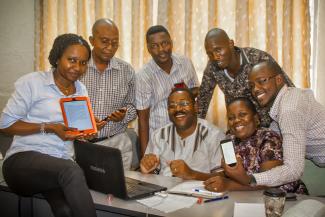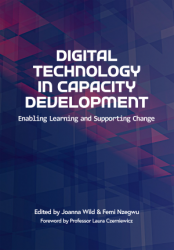Everyone has an equal right to access the world’s collective knowledge, irrespective of geography, wealth, race, ethnicity or gender
Digital platforms and digital learning
For over a decade, INASP has pioneered the use of online learning and digital platforms to support Southern researchers and academics.
We believe that digital tools, used well, can open up access to learning, connect learners to their peers, and bridge gaps in campus-based support. But we always put learners first and technology second.
Building learning communities
AuthorAID is an award-winning community-led platform that brings researchers together to learn and share knowledge. Its mentoring and collaboration platform, journal clubs and discussion spaces enable Southern scholars and students to connect with their peers, seek new ideas and collaborators and develop their own knowledge.
The community is led by our Stewards, a team of experienced researchers and research communicators from across the world - spanning Bangladesh, India, Pakistan, Nepal, Australia, Kenya, Nigeria, USA and Mexico.
Digital learning at scale
Our digital learning platform serves upwards of 7,500 researchers and students from 130 countries each year. Many of our learners are based beyond capital cities and our platform is deliberately designed to be a low-bandwidth, mobile-ready learning space.
When connectivity is poor, we provide downloadable lessons via app, so that learners can keep studying despite internet downtime.
Our Massive Online Open Courses (MOOCs) see completion rates of around 50%, significantly higher than many MOOCs and where a completion rate of 15% is considered successful. Our bespoke courses achieve completion rates of around 75%.
Participants go on to build new research collaborations, publish their research - enabling others to learn from and build on their work - and launch new research projects.
Localising e-learning
We also work with partners to adapt our courses for their own e-learning systems, or to develop their own courses. This helps to bridge gaps in local training programmes, and connect virtual communities to the physical worlds of university campuses and communities.
Six key ingredients for success
From a decade of learning about how to use digital tools effectively we've distilled six key ingredients for success.
- We use a scoping tool, to guide the design and development of our courses and make sure we're always designing for learners and their needs.
- We follow a digital learning design process, based on adult learning theories, to explicitly design for online rather than face to face learning. This enables us to select the best formats and modes of delivery.
- We put learners first and technology second: so we make sure we're focused on what the learners need, and how the technology can support that best.
- We build community and maintain engagement by making our courses social learning spaces.
- We strive to be inclusive, by using online learning to reach people who are less able to access other learning opportunities.
- We track progress and use learning analytics and feedback surveys to see what works, what doesn't, and to keep improving. That helps us understand who completes, who drops out, and which tasks prove more difficult.
Digital Technology in Capacity Development: Enabling Learning and Supporting Change
To read more about how we integrate digital learning into our work, and for ideas and guides to help you to make the most of digital technologies, download our open access book Digital Technology in Capacity Development: Enabling Learning and Supporting Change.
Our digital experts
Meet our digital learning experts here and read more of our latest thinking on digital learning on our blog.


